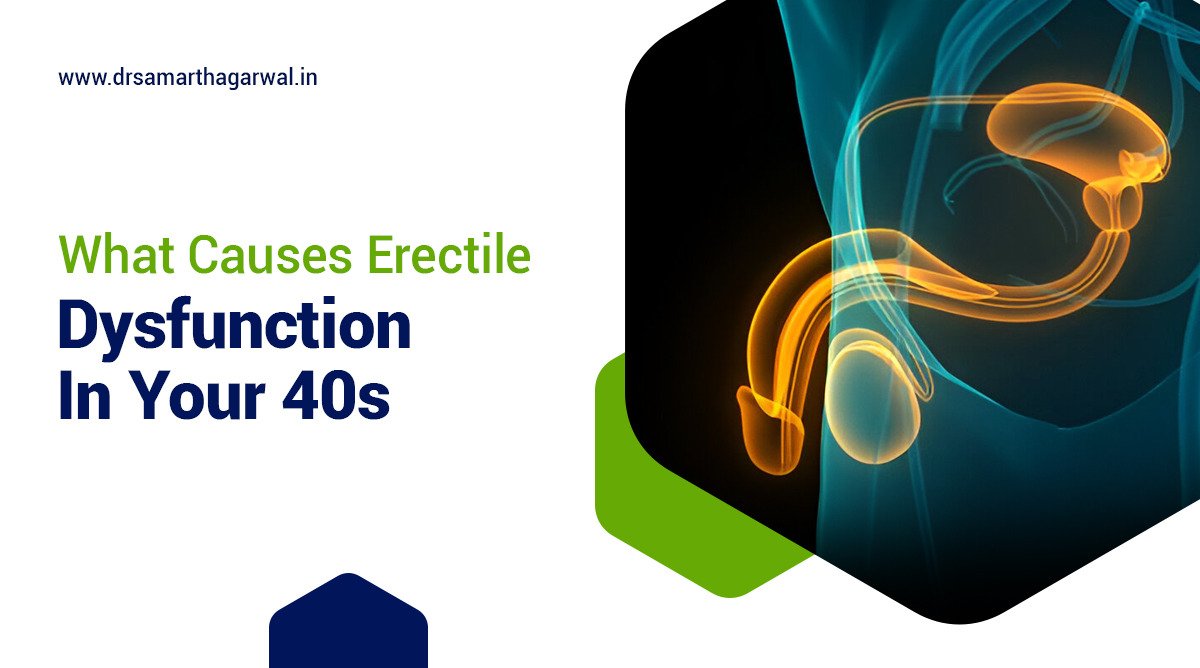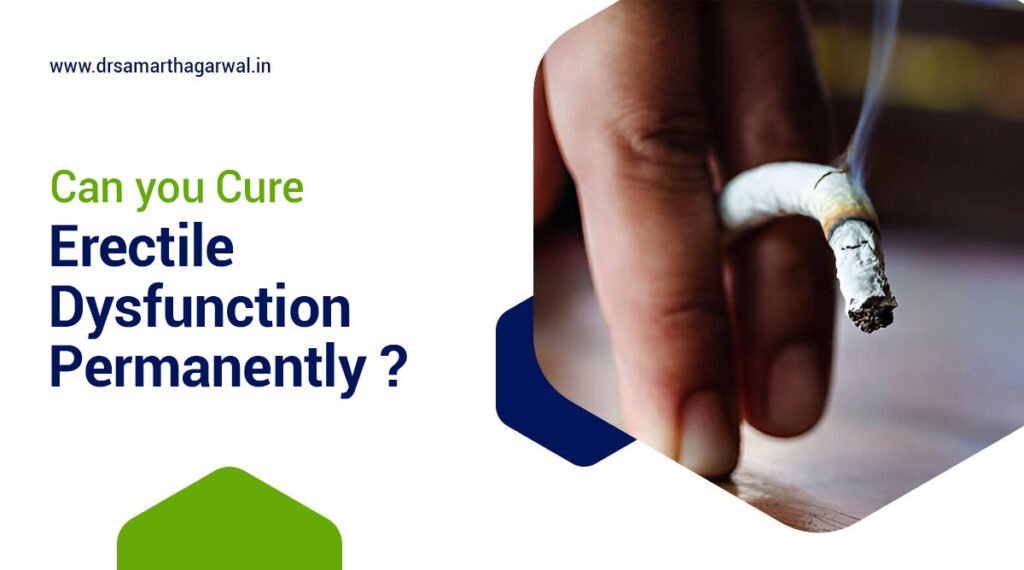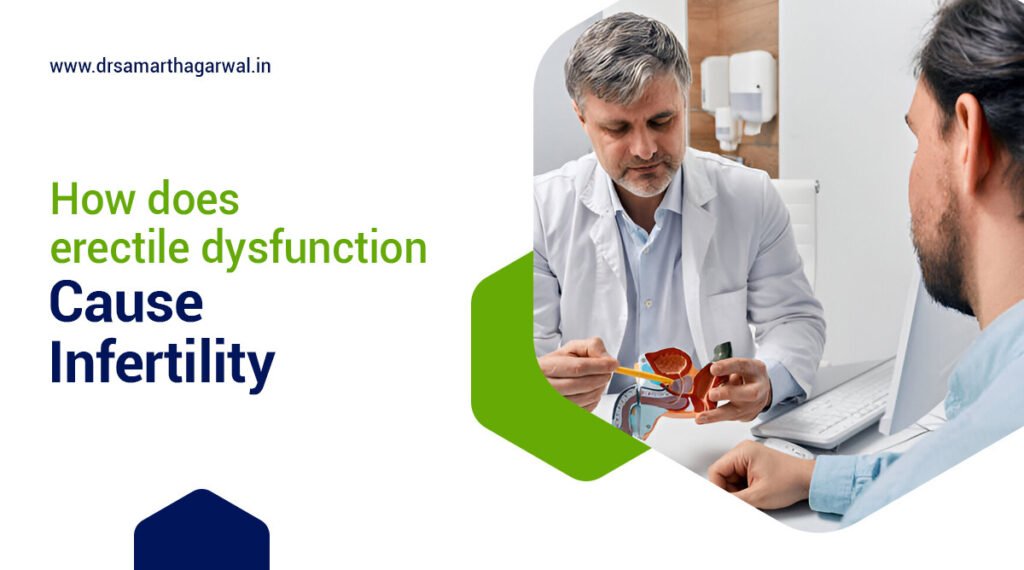Erectile dysfunction (ED) is a common issue that affects many men, especially in their 40s. It means having trouble getting or keeping an erection firm enough for sex.
The incidence of erectile dysfunction in men aged 40 to 69 years old was estimated to be about 26 cases per 1,000 men annually, with the risk increasing with age, lower education, diabetes, heart disease, and hypertension, according to a study by Johannes et al. in the Journal of Urology in 2000, Johannes, C. B., Araujo, A. B., Feldman, H. A., Derby, C. A., Kleinman, K. P., & McKinlay, J. B. (2000).
The causes of ED in your 40s can be categorized into physical and psychological factors. Physical causes often stem from conditions that affect blood flow, such as high blood pressure, high cholesterol, diabetes, and heart disease. These conditions can damage the blood vessels in the penis, making it difficult to achieve an erection.
Stress, anxiety, and depression can also cause ED. These emotional issues can disrupt the brain’s signals to the penis, making it hard to get or keep an erection.
Treatment options for ED include medications, such as sildenafil (Viagra), tadalafil (Cialis), and vardenafil (Levitra), which help increase blood flow to the penis. Lifestyle changes, such as quitting smoking, reducing alcohol consumption, and exercising regularly, can also help improve ED symptoms. In some cases, counseling or therapy may be recommended to address any underlying psychological issues.
Erectile Dysfunction in Your 40s
Erectile Dysfunction (ED) is the inability to achieve or maintain an erection sufficient for satisfactory sexual performance, causing distress and impacting relationships.
Addressing ED in your 40s is crucial as it can be a sign of underlying health issues, such as cardiovascular disease or diabetes, and treating it can improve overall well-being and quality of life.
ED is often misunderstood as a natural part of aging, but it’s not an inevitable consequence of growing older. Many cases of ED are treatable, and seeking help can lead to effective solutions and improved sexual health.
Understanding Erectile Dysfunction
Erectile Dysfunction (ED) is a condition characterized by the inability to achieve or maintain an erection sufficient for satisfactory sexual performance. Common symptoms include difficulty getting or keeping an erection, reduced sexual desire, and decreased libido.
ED can be a distressing experience, affecting not only physical intimacy but also emotional well-being and relationships. Recognizing the signs and symptoms is crucial for seeking timely medical attention and effective treatment.
Difference Between ED and Other Sexual Dysfunctions
Erectile Dysfunction is distinct from other sexual dysfunctions, such as premature ejaculation, low libido, and orgasmic disorders. While these conditions can coexist, understanding the specific characteristics of ED is essential for accurate diagnosis and treatment.
Role of Blood Flow in Erections
Blood flow plays a critical role in achieving and maintaining erections. During sexual arousal, blood vessels dilate, allowing increased blood flow into the penis, causing it to become erect. Any disruption in blood flow can lead to ED, highlighting the importance of cardiovascular health.
Nervous System and Erections
The nervous system is vital for erectile function, as it transmits signals between the brain and penis. Damage to nerves or neurological conditions can impair these signals, leading to ED. Understanding the complex interplay between the nervous system and erectile function can help identify potential causes and treatment options.
Hormonal Influence on Erectile Function
Hormones, particularly testosterone, significantly impact erectile function. Hormonal imbalances or deficiencies can contribute to ED, and understanding the role of hormones can help identify underlying causes and guide treatment decisions.
Physical Causes of Erectile Dysfunction in Your 40s
Erectile Dysfunction (ED) in your 40s can be attributed to various physical factors, which are crucial to understand for effective management and treatment.
Cardiovascular Issues
Cardiovascular problems, such as blood flow issues, heart disease, and high blood pressure, can significantly contribute to ED in your 40s. These conditions can damage blood vessels, reducing blood flow to the penis and making it difficult to achieve or maintain an erection.
Erectile dysfunction (ED) is a common condition in men who are 40 years and older, with prevalence increasing with age and other co-morbidities, such as cardiovascular disease, diabetes mellitus, hyperlipidemia, and hypertension. According to Leslie, S. W., & Sooriyamoorthy, T. (2024). Erectile Dysfunction. In StatPearls [Internet]. Treasure Island (FL): StatPearls Publishing; 2024 Jan. 2024
Metabolic Disorders
Metabolic disorders, including diabetes, high cholesterol, and obesity, can also lead to ED. These conditions can damage blood vessels, nerves, and hormones, disrupting the complex process of erection.
Neurological Conditions
Neurological conditions, such as spinal cord injuries and nervous system disorders, can affect the transmission of signals between the brain and penis, leading to ED.
Hormonal Imbalances
Hormonal imbalances, including low testosterone levels and thyroid disorders, can impact erectile function, making it essential to address these underlying issues.
Medication Side Effects
Certain medications, such as those used to treat cardiovascular issues, can contribute to ED as a side effect. Understanding the potential impact of long-term medication use is vital for managing ED.
Psychological Causes of Erectile Dysfunction in Your 40s
Erectile Dysfunction (ED) in your 40s can be attributed to various psychological factors, which are essential to understand for effective management and treatment. Psychological causes can be just as significant as physical ones, and addressing them can lead to improved erectile function and overall well-being.
Stress and Anxiety
Chronic stress and anxiety can negatively impact erectile function, leading to ED. Performance anxiety, in particular, can create a cycle of fear and doubt, making it difficult to achieve or maintain an erection. Managing stress and anxiety through relaxation techniques and counseling can help alleviate ED symptoms.
Depression and Mental Health Issues
Depression and mental health issues can significantly impact sexual health, leading to ED. Treatments for mental health conditions, such as antidepressants, can also contribute to ED. Understanding the complex relationship between mental health and erectile function can help identify effective treatment strategies.
Relationship Issues
Interpersonal relationships and communication with partners can influence sexual performance and contribute to ED. Addressing relationship issues and improving communication can help resolve ED symptoms and strengthen relationships.
Lifestyle and Behavioral Factors
Lifestyle and behavioral factors play a significant role in erectile dysfunction (ED) in your 40s. Adopting healthy habits and avoiding harmful behaviors can help prevent or manage ED, improving overall well-being and sexual health.
Dietary Habits
A balanced diet rich in foods that promote blood flow, such as leafy greens, berries, and omega-3 fatty acids, can support erectile function. Conversely, diets high in processed foods, sugar, and saturated fats can negatively impact blood flow and contribute to ED.
Physical Activity
Regular exercise, especially aerobic exercises like cycling, swimming, and brisk walking, can improve cardiovascular health, boost testosterone levels, and enhance erectile function. Exercises that strengthen the pelvic floor muscles, such as Kegel exercises, can also benefit ED.
Pelvic floor exercises have been shown to improve erectile function in men with erectile dysfunction, according to a clinical trial by Dorey, G., Speakman, M. J., Feneley, R. C. L., Swinkels, A., Dunn, C. D. R. (2005). Pelvic floor exercises for erectile dysfunction. British Journal of Urology International.
Substance Use
Substance use, including excessive alcohol consumption, smoking, and illicit drug use, can significantly contribute to ED. Alcohol can impair blood flow, while smoking damages blood vessels and reduces circulation. Illicit drugs can disrupt hormonal balances and nerve function, leading to ED. Quitting or reducing substance use can help alleviate ED symptoms.
Diagnosing Erectile Dysfunction
Diagnosing erectile dysfunction (ED) in your 40s involves a comprehensive approach to identify underlying causes and develop an effective treatment plan. Accurate diagnosis is crucial for addressing physical, psychological, and lifestyle factors contributing to ED.
Initial Self-Assessment
Recognizing symptoms of ED is the first step towards diagnosis. Men experiencing difficulties getting or maintaining an erection, reduced libido, or decreased sexual satisfaction should take note of their symptoms and medical history to discuss with their doctor.
Medical Consultation
Consulting a doctor is essential for diagnosing ED. Your doctor will discuss your medical history, perform a physical examination, and provide a safe space to share sensitive information. Open communication with your doctor helps identify underlying causes and develop a personalized treatment plan.
Diagnostic Tests
Diagnostic tests, such as blood tests to check hormone levels, penile ultrasound to assess blood flow, and other diagnostic tools, may be used to identify underlying causes of ED. These tests help determine the root cause of ED, guiding treatment decisions and ensuring effective management.
Treatment Options for Erectile Dysfunction
Treatment options for erectile dysfunction (ED) in your 40s are diverse and cater to individual needs. A comprehensive approach may involve medical treatments, non-medical interventions, psychological counseling, and lifestyle changes to address physical, psychological, and behavioral factors contributing to ED.
Medical Treatments
Medical treatments for ED include phosphodiesterase inhibitors like sildenafil, which enhance blood flow, and hormone replacement therapy to address hormonal imbalances. These treatments can help restore erectile function and improve sexual satisfaction.
Non-Medical Interventions
Non-medical interventions, such as penile implants and vacuum erection devices, offer alternative solutions for ED. Penile implants provide a permanent solution, while vacuum erection devices offer a non-invasive, temporary solution.
Psychological Counseling
Psychological counseling addresses psychological causes of ED, such as stress, anxiety, and relationship issues. Therapy methods like cognitive-behavioral therapy and couple’s therapy can help individuals and couples overcome psychological barriers to erectile function.
Lifestyle Changes
Lifestyle changes, including dietary adjustments and regular physical activity, can significantly impact ED. A balanced diet, rich in fruits, vegetables, and whole grains, and regular exercise can improve cardiovascular health, boost testosterone levels, and enhance erectile function.
Preventing Erectile Dysfunction in Your 40s
Preventing erectile dysfunction (ED) in your 40s involves adopting a proactive approach to maintain overall health and well-being. By making informed lifestyle choices and staying on top of regular medical check-ups, you can reduce the risk of developing ED and promote healthy erectile function.
Maintaining a Healthy Lifestyle
Maintaining a healthy lifestyle is crucial for preventing ED. This includes following a balanced diet rich in fruits, vegetables, and whole grains, engaging in regular exercise, and avoiding harmful substances like tobacco and excessive alcohol. A healthy lifestyle can help manage stress, boost testosterone levels, and improve cardiovascular health.
Regular Medical Check-Ups
Regular medical check-ups are essential for preventing ED. Routine health screenings can help identify underlying health issues, such as diabetes, high blood pressure, and high cholesterol, which can contribute to ED. Monitoring blood pressure and cholesterol levels can help prevent cardiovascular disease, a common cause of ED. By staying on top of your health, you can address potential issues before they impact erectile function.
Coping Strategies and Support
Coping with erectile dysfunction (ED) in your 40s requires a comprehensive approach that addresses emotional, psychological, and practical aspects. Developing effective coping strategies and seeking support can help you navigate the challenges of ED and improve your overall well-being.
Emotional Support
Emotional support from loved ones, such as partners, family, and friends, can play a vital role in coping with ED. Sharing your experiences and feelings with others can help you feel less isolated and more supported. Joining support groups for men with ED can also provide a sense of community and connection with others who understand your experiences.
Long-Term Management
Long-term management of ED requires sustainable practices and realistic expectations. This involves adopting healthy lifestyle habits, such as regular exercise and balanced diet, and engaging in stress-reducing activities. Setting realistic expectations about treatment outcomes and sexual performance can also help you cope with ED and maintain a positive outlook.
Frequently Asked Questions (FAQs)
How common is erectile dysfunction in men over 40?
Erectile dysfunction (ED) is a prevalent condition in men over 40, affecting over 50% of men between the ages of 40 and 70, according to various medical research. For instance, a study showed that 52% of men aged 40–70 years had some degree of ED, with moderate-to-complete ED being encountered in 34.8% of cases. This condition is not uncommon, and it’s essential to seek medical advice if experiencing persistent difficulties.
Erectile dysfunction (ED) is a common condition in young men, with a prevalence as high as 30%, according to a review by Nguyen et al. in the journal Sexual Medicine Reviews in 2017 by H. M. T., Gabrielson, A. T., & Hellstrom, W. J. G. (2017). Erectile Dysfunction in Young Men-A Review of the Prevalence and Risk Factors. Sexual Medicine Reviews
Can lifestyle changes alone improve erectile function?
Lifestyle changes, such as increased physical activity, a healthy diet, and reduced caloric intake, have been associated with the improvement of erectile function in the general male population. Research suggests that lifestyle changes alone can significantly improve erectile dysfunction, but it’s essential to consult with a healthcare professional for personalized advice. Specifically, eating a diet rich in fruits, vegetables, fish, and whole grains, as well as regular exercise, can help reverse ED. Additionally, avoiding certain foods like processed meats, high-fat dairy, and sugary drinks may also contribute to improved erectile function.
What should I discuss with my doctor if I think I have ED?
Directly express your concerns: Start by saying, “I think I may have ED.”
Prepare for the discussion: Write down details of your experiences before your appointment.
Discuss your medical history: Your doctor will ask about your medical history, medications, and lifestyle habits.
Ask about potential causes: Ask your doctor what they think is causing your erection problems.
Inquire about tests: Ask about the tests you need to determine the cause of your ED.
Explore treatment options: Depending on the cause and severity of your ED, you might have various treatment options.
Ask about side effects and risks: Discuss potential side effects and risks of each treatment option.
Follow-up appointments: Schedule follow-up appointments to monitor your progress and adjust treatments if necessary.
Consider a referral: If you sense your doctor is uncomfortable talking about your ED, ask for a referral to a urologist.
Research and ask questions: Learn about ED, its causes, and treatments before your appointment to be well-informed.

Contact Dr. Samarth Agarwal if you have any questions or concerns about your Urinary health!







